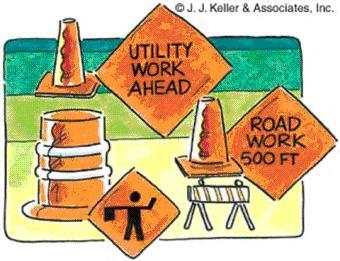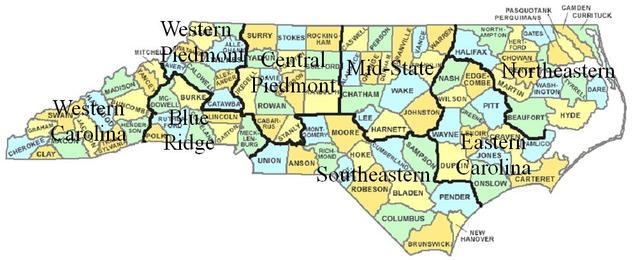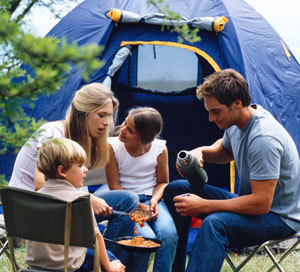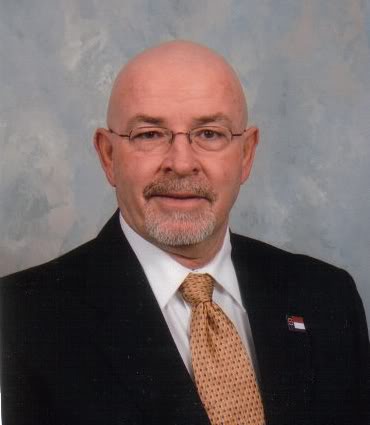Greetings
Friends in the Name of Safety:
It's Here! Pre-register for
the conference and stay at the Sheraton!!!
The
79th Annual Statewide Safety Conference
May 12 - 15, 2009 at the Joseph Koury
Convention Center in Greensboro is just
about here. We are asking that you help us
keep this Conference "free" by making your
hotel reservations at the Koury Convention
Center if at all possible. In order to keep
the charges for meeting space at a minimum,
we need your support.
We have moved the
SAFETY TALK CONTEST to Wednesday morning
this year to help you get more value for the
day as well. NETWORKING is always rewarding
at our Vendor sponsored Reception Wednesday
evening from 5:00 p.m. until 7:30 p.m.
By
CLICKING HERE you can pre-register for
the conference and download and
PRINT the program to show your boss why
they can't afford not to send you to this
conference this year. There's no better way
to face the challenges of 2009!
We look forward to a great conference and
hope to see you there!
|
Slow Down For Work Zones

Those hot, sunny
days of summer are almost here.
However, summer also means increased
road construction and increased
danger for motorists and workers.
Work zone activity is increasing
because many of our highways are
over 30 years old and they need
repairs. Much of the construction is
occurring on roads that are already
congested from high traffic, which
causes delays and frustration for
drivers.
Did you know that:
- One work zone
fatality occurs every 8.5 hours
(3 per day).
- One work zone
injury occurs every 13 minutes
(113 per day).
- Four out of
every five work zone fatalities
were motorists.
Safe
driving tips
The Federal Highway
Administration recommends the
following tips for driving safely in
work zones:
- Be patient
and stay calm,
- Pay attention
to the signs,
- Don't
tailgate by keeping a safe
distance between you and the car
ahead of you,
- Schedule
enough time to drive safely by
checking the radio, TV, and
websites for traffic
information,
- Turn on
headlights so workers and other
drivers can see your vehicle,
and
- Be ready for
rough roadways that can affect
your driving.
Keep these safety tips in mind while
cruising our states's highways this
summer.
|
Regional Safety Councils

Please do not forget to support your
Regional Safety Councils by joining
their membership ranks and participating
in their scheduled events. For
membership applications, see the Quick
Links to the right.
|
Are you exposing your family to
dangers?
Taking the
precautions to prevent illness or injury
due to contact with hazardous substances
should not end when a work shift ends.
Unfortunately, many employees may
unknowingly bring hazardous substances
home from work on their clothes, bodies,
or tools, exposing their families to
dangerous chemicals. Such incidents have
resulted in a wide range of health
effects among workers' families,
including respiratory problems,
neurologic disorders, and fatal
poisonings.
What are the exposure routes?
Hazardous substances have
reached workers' homes and families
through:
-
Work
clothing. Cases involving
beryllium, lead, pesticides, and
other chemicals have historically
been dangerous to families. In some
instances, washing machines and
dryers contained dangerous levels of
the materials, poisoning family
members laundering work clothes and
contaminating other laundry.
-
Tools and equipment. There
have been cases involving mercury,
pesticides, PCBs, and radioactive
material. These substances, brought
home on hand tools and other
equipment, have contaminated homes
and vehicles.
-
Worker's body. Workers have
also passed dangerous materials to
their family members by their hands
in some cases.
-
Work
items. Bringing items home
from work, such as bags, rags, metal
drums, and scrap lumber have caused
serious and fatal poisonings of
family members.
What preventative measures can be taken?
For workers whose jobs are away from
home, the following prevention safety
tips may be useful:
- Use good
safety practices to reduce
exposure;
- Leave soiled
clothes at work;
- Change
clothes before leaving work;
- Store
non-work clothes away from work
clothes;
- Shower before
leaving work;
- Do not take
tools, scrap, packaging, and
similar items home;
- Launder work
clothes separately; and
- Prevent
family members from visiting the
work area.
For workers whose jobs are in their
homes:
- Keep work
areas and living areas separate;
- Keep family
members out of the work area;
- Store
hazardous substances properly;
- Dispose of
dangerous materials properly;
- Wash work
clothes separately; and
- Inform
workers and household members of
potential dangers.
|
NCIC Video Library
Check out our
Video Library !
View our online
Video/DVD listings. The new listings are
in
RED.
To view the rest of our Library and
download the REQUEST FORM, please
CLICK HERE
|
Safe
and
Green Spring Cleaning

Spring cleaning time is
here again, but before you break out the
cleaning supplies, take a few minutes to
make sure you know how to properly
handle and dispose of household
hazardous waste (HHW). Following the
guidelines below can help protect
individuals and families from chronic
health hazards, reduce waste, minimize
disposal hassles, and ultimately save
you money.
Read and follow the label.Before you
buy, always check the product labels. It
is important to look for labeling that
reads:
DANGER, WARNING, TOXIC, etc.
These warnings tell you if the product
is harmful and how to use, store, and
dispose of it safely.
Consider exposure time. Before using a
product, consider the extent of your
exposure. People who use cleaning
products all day face greater exposure,
and thus greater risk, than occasional
users of the product.
Keep products in their original
containers,use them properly, and store
them as directed.
Dispose of household products safely.
Many communities offer a variety of
options for safely managing your HHW.
Check with your local solid waste
authority for collections in your area.
Try alternative products when available.
For many everyday tasks, there are
readily available products that can
serve the same purpose, may be less
harmful, and may even cost less. For
example, mixing one tablespoon of
vinegar or lemon juice in one quart of
water makes an excellent glass cleaner.
By carefully choosing cleaning products,
you can reduce hazards to worker health
and the environment, and avoid headaches
(literally and figuratively) when
handling and disposing of cleaning
products. The effort made in purchasing
can pay off with reduced health
problems, as well as reduced waste and
waste handling costs.
|
|
Budget Trips
By Michael Nance
A long (long) time ago I was
in the Cub Scouts. It lasted one year.
Partly because our family moved from
Kentucky to North Carolina, but the main
reason was because the other scouts played
and broke my favorite toys. I wasn't a
happy camper. Truth be known, there is a
third reason. I love my mother, but she
tried to be the den leader and it just
didn't work out. Not to mention that the
meetings were at our house,...all of them.
I had this bad taste for a long time. Not
unlike the person who works in a pizza
parlor and grows up hating pizza.
My son started scouting about the same age
that I did. He has been involved for four
years and is now an official "Boy Scout".
Even though I have nightmares from time to
time, I still try to get involved with the
activities, etc. Many of you have heard a
few of the war stories relating to Lockout/Tagout
and Machine Guarding.
Camping and scouts go hand-in-hand. The
Troop plans an outdoor event once a month
during the 12 months of the year. Rain or
Shine, Cold or Hot. Some of the camping
trips are driving right in and some are a
pretty good hike to get to the campsite.
Since my son is responsible for a part of
the supplies (as each of the scouts are), we
reviewed the scout handbook to go over a few
things.
With the economy the way it is, a lot of
families are opting to trim their vacation
expense. Spending $2,000 to rent a beach
house for one week is no longer an option
for many of us. (The $2k doesn't include
gas, food, etc) Our family has decided to
practice many of the things the scouts try
to teach. We've always enjoyed camping and
hiking with our friends but usually the
adults ended up doing everything. This
year, the kids will have responsibilities,
just like in scouting. One of those
responsibilities is the Safety Attitude. It
may be a bend here, but hear me out. The
Outdoor Code for scouts goes like this: "As
an American, I will do my best to 1) Be
Clean - in my outdoor manners. 2) Be
Careful - with fire. 3) Be Considerate -
in the outdoors and 4) Be
Conservation-Minded. This code reminds us
of the importance of caring for the
environment. I don't think the points of
the Outdoor Code need to be expanded on.
They sort of speak for themselves.
Remember the length of your hike when
preparing to backpack. Some have internal
frames and some have external frames. It
depends on comfort, but usually external
frames are good for hiking on open trails
while the internal ones are a good choice
for skiing and mountaineering style hiking.
I think back to the military days and how we
learned to pack stuff. To this day, my wife
still wants me to pack her suitcase and the
car on any trip, whether I'm going or not.
Remember that if you're hiking into a
campsite that is several miles, you have to
take everything you need in the backpack.
Everything.
Selecting a campsite is important. State
Parks are usually a best bet for family
camping. They are patrolled and usually
clean. With the Appalachian Trail style of
hiking camping, best have someone with you
that's been before. I've been three times
on portions of the AP. Each time was a new
experience.
Another very important ethics statement in
scouting is the "Leave No Trace". Our
country's environment would be in much
better shape if we all would adopt it.
Again, from the scout book about Leave No
Trace: 1) Plan ahead and prepare 2)
Travel and camp on durable surfaces 3)
Dispose of waste properly (Pack it in, pack
it out) 4) Leave what you find 5)
Minimize campfire impacts 6) Respect
wildlife 7) Be considerate of other
visitors. Not a real hard thing to follow
is it.
Since many of us are concerned about the
future with regards to employment, economy,
global warming, gas costs, etc, we can find
ways to cut a vacation expense in many
areas. Camping is one of my favorites.
Once the initial "hardware" of supplies are
purchased the cost is fairly cheap. In
fact, many of the camping items come in real
handy if the power goes out or in case of a
natural disaster.
While this article didn't have a lot to do
with workplace safety, I do think it is
important to remember that a lot our Safety
Attitudes at work should also be reflected
in the home place. I always try to include
something about home stuff in our
presentations. Safety doesn't end when you
clock out. Scouting is just one of many
organizations that promote safety in a
direct way. It builds character,
citizenship, and fitness. Hopefully my son
will stick out the tough times of scouting.
I'll do my best to support him and the other
boys. Completing Eagle Scout is very worthy
goal and very demanding. Fewer than 4
percent of all scouts earn the Eagle rank.
Perhaps that's why when it is listed on a
resume; it carries more weight than just
about anything else.
Happy camping and remember to do your part
with the Outdoor Code and the Leave No
Trace. Your kids and grandkids will be glad
you did. Great places to go camping and
hiking can be found in the Our State
magazine, my personal favorite magazine.
And to all you Eagle Scouts, well done.
Editor's
note: Michael Nance is the NCIC Blue Ridge,
Southern & Western Piedmont areas Safety
Representative. If you are interested in
having one of our programs in your area,
please give Michael a call at 919-218-9047
or email him at Michael.Nance@ic.nc.gov
|
From the Desk of
Dennis Parnell

Director Safety Education
You know you shouldn't...
...but you still say "yes."
If you've ever had one of those out-of-body
experiences during which you hear yourself
committing to a time-consuming task even
though you're already swamped, you're not
alone. For many people, saying "no" at work,
to friends, or even to family members is
next to impossible. Unfortunately, this can
make finding balance a very elusive task.
Many people worry that saying no will make
them seem unreliable, cost them business,
disappoint others, or cause them to appear
rude or lazy. Unfortunately, the reality is
that constantly saying yes can be just as
problematic. You might please people
initially by saying yes, but how are those
same people going to feel if when they
realize you spread yourself too thin?
The key to successful nay-saying is having a
good understanding of - and a strong
commitment to - your priorities. When things
clearly do not fit into your life, be firm -
and don't feel guilty - your fear of
disrespecting your own time and your time
with loved ones should always be greater
than your fear of disappointing others.
Now you know. Dennis :)
|
Insight!
Fun and useless tidbits

-
Halle Berry
2002 --- 1st African American woman to
win an Oscar for Best Actress.
-
Alexander Winton
1903 --- set the 1st land speed record
in car racing. Set at Daytona Beach, his
speed was 68.18 mph
-
Annie G. Fox
1941 --- 1st woman to receive the US
Purple Heart Medal. She was wounded
while serving at Hickam Field during the
Japanese attack on Pearl Harbor, Dec 7
1941.
- Chuck Yeager
1947 --- 1st person to break the sound
barrier by flying faster than the speed
of sound. (On October 14, 1947, he flew
a Bell X-1 rocket at 670 mph in level
flight.)
- Samuel Hopkins
1790 --- holder of US Patent #1.
Thousands of patents were issued before
his, but his was the first when the
numbering started. He patented a process
for making potash and pearl ashes.
- André-Jacques
Garnerin
1797 --- 1st parachute jump. Dropped
from a balloon, about 6,500 ft. over
Monceau Park in Paris in a
23-ft.-diameter parachute made of white
canvas with a basket attached (Oct. 22).
- Sam Patch
1829 --- 1st first known person to
survive the jump off of Niagara Falls.
|
Controlling
Anger
Everyone gets angry,
but regardless of whether anger is
justifiable or irrational, it's important to
know how to manage anger and prevent it from
escalating to the point that it affects your
relationships or becomes counterproductive.
Consider the following strategies to control
anger:
Change the way you think. Instead of
allowing anger to well up and lead to
irrational thoughts, acknowledge that you're
upset and that it's possible that you're
being overly dramatic about the situation.
Remind yourself that over-the-top anger is
not likely to help remedy the situation.
Remember that not every problem has a
solution. Sometimes anger is the result of a
difference of opinion, and sometimes people
simply won't see eye-to-eye. Be aware that
the kind of solution you hope to find for a
particular problem (e.g., getting two people
to agree) may not exist. Figuring out how to
move on despite an existing problem can
still be a success.
Don't jump to conclusions. Many times, when
people feel that they've been wronged, they
make quick assumptions about other people's
intentions. You might be able to save
yourself quite a bit of grief by calmly
inquiring about why something took place.
Laugh. Humor is a great way to diffuse
anger, and if you're willing to see the
humor in a situation, you might be able to
confront a problem more constructively.
Change your surroundings. Stress is often a
catalyst for conflict, and removing yourself
from a situation that is causing tension -
even if just for a few minutes - can often
help you to regain a more balanced
perspective.
Rethink your perspective. Sometimes anger is
the result of not getting what you want or
need in a situation. However, it's important
to realize that this may be the same for
other people too. Consider whether you could
be giving more of what you'd like out of the
situation to the others involved. This could
include things like appreciation, fairness,
or the willingness to compromise.
|
 Asthma
and the Flu Asthma
and the Flu
For parents who have children
with asthma, it may seem like there's
nothing worse than watching a child struggle
to breathe or experience an asthma attack.
Unfortunately, while managing a child's
asthma may be tough on its own, children
with asthma are also particularly in danger
of developing additional complications in
conjunction with other illnesses, like the
flu.
Almost 7 million children in the United
States have asthma. While those children are
no more likely to catch the flu than
children who do not have asthma, they are
more likely to have serious complications
from the flu, such as pneumonia. Children
with asthma are four times more likely to
require hospitalization because of the flu
than children who do not have asthma.
One of the best ways to keep children with
asthma safe from the flu is to make sure
they receive a flu vaccine every year. Other
members of the child's household as well the
child's caregivers should also be vaccinated
against the flu so as not to infect the
child. Of course, children also should be
taught proper hand washing techniques to
prevent the spread of germs.
|
|
About N.C. Industrial Commission
Safety Section
The N.C. Industrial
Commission Safety Education Section stands
ready to assist you with your Safety
training needs. We offer a variety of
courses, designed to suit your needs. Please
give one of our Industrial Safety
Representatives a call.
 DENNIS
PARNELL DENNIS
PARNELL
Director Safety Education
919-218-3000-Cell
919-807-2602
Dennis.Parnell@ic.nc.gov
 KIM
NADEAU
Program Assistant
919-807-2603
919-218-9049-Cell
Kim.Nadeau@ic.nc.gov
 RANDY
CRANFILL RANDY
CRANFILL
Western Carolina Area & APCAP & APW
Coordinator
919-218-2986
Randy.Cranfill@ic.nc.gov
 ALVIN
SCOTT ALVIN
SCOTT
Eastern & Northeastern Areas, Eastern
Defensive Driving Instructor
919-218-2792
Alvin.Scott@ic.nc.gov
WE ARE WORKING FOR YOU!
|
|
|
|
Quick Links
May 12 - 15, 2009
EXHIBITORS!
|
|
Quick Links
Seven-tenths of a second
|
|
Quick Links
Construction
Are trench excavations confined spaces?
|
|
Quick Links
General
Industry
Attitude &
Behavior
|
|
Quick Links
Fleet Safety
Flashing Yellow
|
|
Quick Links
CENTRAL
PIEDMONT SAFETY COUNCIL
Membership
Brochure
|
|
Quick Links
EASTERN
CAROLINA SAFETY COUNCIL
Membership
Brochure
|
|
Quick Links
SOUTHEASTERN SAFETY COUNCIL
Membership
Brochure
|
|
Quick Links
WESTERN
PIEDMONT SAFETY COUNCIL
Membership
Brochure
|
|
Quick Links
MID-STATE
SAFETY COUNCIL
Membership
Brochure
|
|
Quick Links
BLUE RIDGE SAFETY COUNCIL
Membership Brochure
|
|
Quick Links
NORTHEASTERN SAFETY COUNCIL
Membership Brochure
|
|
Quick Links
WESTERN
CAROLINA SAFETY COUNCIL
Membership Brochure
|
|
Quick Links
NC RURAL WATER ASSOCIATION
|
|
Quick Links
SIGN-UP FOR OUR NCIC SAFETY
BULLETIN
Email/Newsletter
|
|